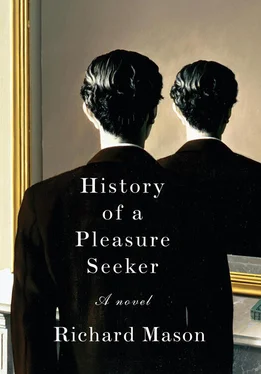In this way, neither husband nor wife communicated anything of substance. All Jacobina did to show Maarten she was sorry for a crime to which she would never confess was exert herself at the Plaza’s opening and ensure by the deft bestowing of an empty suite that the first name in the visitors’ register was “Vanderbilt.”
Piet Barol did not insult Egbert Vermeulen-Sickerts by telling him that the Shadowers were not real. To the child they were very real indeed, and that was the only useful truth. He addressed him on the subject, therefore, as one general to another on the eve of a great battle.
First he ascertained the enemies’ methods and territory. He observed Egbert crossing the entrance hall floor and inquired what the punishment was for seven missteps. When he learned of the ice-cold baths he almost cried. He saw to it that a warm one was run for Egbert every morning and evening and that at other times the cistern in his private bathroom was drained and inoperable. This innovation produced a gradual but unmistakable improvement. So did jovial admiration. When he told the boy he looked braver and stronger every day, Egbert began to feel brave and strong. It was his first encounter with these emotions and he enjoyed it wildly. He began to dare other audacities for the pleasure of recounting them to his tutor, who listened with absolute attention.
For the first time a genuine affection blossomed between them, nourished by a sincere unity of purpose. On the seventeenth day of joint operations Egbert did not accept the first number announced to him and crossed his aunt’s entrance hall floor in 70 steps rather than 821. In celebration of this triumph Piet asked Mrs. de Leeuw to make one of her excellent apple cakes. They shared it while conducting an optimistic review of their progress.
Egbert sat on the midnight-blue sofa in his great-aunt’s drawing room, his feet on the cushions and crumbs on his lap. Piet had never sworn in his presence and did so now to reinforce their comrade bond. “We’re ready for a stand against these bastards, Egbert. We must defy them.” He offered the child his hand. “If I lead, will you follow?”
Two weeks later, Agneta Hemels gave way to the temptations that had besieged her since her first sight of New York. Standing on the Lusitania ’s deck as she steamed into the harbor, the city’s glinting towers had struck her like a land in a fairy tale. The chaos of porters and automobiles on the quay had given this paradise an earthly dimension. But in the seething swirls of humanity she had glimpsed a treasure that cozy little Amsterdam could never offer: anonymity.
Agneta had spent her life in the company of people who knew her. She had never strayed three streets beyond her home without encountering an acquaintance, and this had required her to spend thirty-two years on guard.
She was a private woman, with a dread of gossip. New York’s utter indifference excited her as much as it frustrated Maarten. As Jacobina’s maid she had traveled extensively through Europe and seen much to admire; but nothing — not Versailles nor the Coliseum, not even the soaring cathedral at Köln — had inspired the rush of love New York did.
She had accompanied her mistress on shopping trips that left her wide eyed with wonder. Crossing town in a hansom cab as the avenues swung out to left and right, she had been unable to contain her enthusiasm or understand Jacobina’s lack of it. The joylessness with which Mevrouw Vermeulen-Sickerts acquired expensive clothes and trinkets disgusted her. It seemed grossly unfair to Agneta that a woman so free from financial constraint should derive so little pleasure from it, and this thought began to undermine her ability to refrain from judging her betters.
From her little room on the top floor of the Metropole, Agneta stared out over the city’s lush park and sparkling rooftops, her heart aflame. She was allowed an afternoon off once a fortnight. Though the first of these was delirious, her second solitary promenade was spoiled by her simple Dutch clothes, which did not at all complement the triumphant splendor of the city.
It was on her return from this unsatisfactory expedition that Agneta was beset by the most seductive temptation of her life. As she put away Jacobina’s latest purchases and added them to the inventory of her clothes, the desire to wear one of them, and to wander down Fifth Avenue like a fine lady, took hold of her. It became imperative when she removed from a box an afternoon gown of peacock-blue satin with a jacket trimmed in ermine. She held it up to the glass. She was not as tall as Jacobina, but she knew that in the closet was a pair of very high-heeled shoes that would solve this problem. She went to the door and locked it, though she knew her mistress was at a fitting. It was four o’clock in the afternoon. She was not on duty again until six. Might she not …?
She did.
She took off her own dress and hung it in the wardrobe. Then she sat at the dressing table and arranged her hair. When that was done to her satisfaction she put on the peacock-blue satin, which did wonders for her eyes. Bravely she stepped into the high-heeled shoes and contemplated herself in the mirror. The transformation was dazzling. She went to the safe and removed Jacobina’s jewel box. From this she took the sapphire choker that had been bought for Constance and a pair of pearl earrings.
Agneta was at heart a modest woman, but the city’s immodesty had infected her. Now she laughed to see how magnificent she looked. She left the Vermeulen-Sickerts’ suite and entered the elevator. Although the operator saw her every day he did not recognize her and bowed. Two gentlemen entered the lift and bowed also.
“May I order a carriage for you, miss?” asked the doorman, as though he could think of no greater honor.
“No, thank you. I prefer to walk.” And Agneta swept past him to find that the crowds on Fifth Avenue parted for her and every gentleman among them doffed his hat.
That same afternoon, October 21st, an unforeseen catastrophe occurred that provided Maarten with conclusive proof of God’s directed wrath. He had an appointment with the chairman of the Knickerbocker Trust Company and had spent the morning honing what he intended to be a brilliant performance. If he could obtain a further million dollars in America, he felt confident of making up any further shortfall with European capital and thus prevailing against the odds. He was aware, however, that nothing repels credit like desperation; and because he was desperate he had taken the step of ordering a cocktail at luncheon.
He emerged from his cab ten minutes early, feeling cavalier. He was disconcerted to find a line outside the company’s offices and annoyed when the doorman refused to let him step past it.
“But I have an appointment with Mr. Barney.”
“Mr. Barney is seeing no one today.”
Over this individual’s shoulder, Maarten could see into the green marble banking room. It took him a moment to decode the chaos at the tellers’ windows. Every person in the long line was withdrawing money, apparently as much as they could. The doorman pushed him roughly aside, and when Maarten said, “I will report this insolence to Mr. Barney himself!” the man shrugged and said, “Mr. Barney’s resigned. Join the line like everyone else.”
To be treated in this peremptory fashion reminded Maarten of slights he had endured in his youth and overcome. Seeing that nothing more was to be gained by complaining, he joined the line, noting with alarm that among the ranks of messenger boys were persons of quality, evidently unwilling to rely on subordinates to retrieve their funds for them. From a lady in green serge and fox fur he learned that Mr. Barney had been implicated in a failed attempt to corner the stock of the United Copper Company; that this had exposed a web of risky commitments between the banks he had an interest in; and that it was rumored the Knickerbocker Trust Company did not have sufficient reserves to honor the claims of its depositors.
Читать дальше












